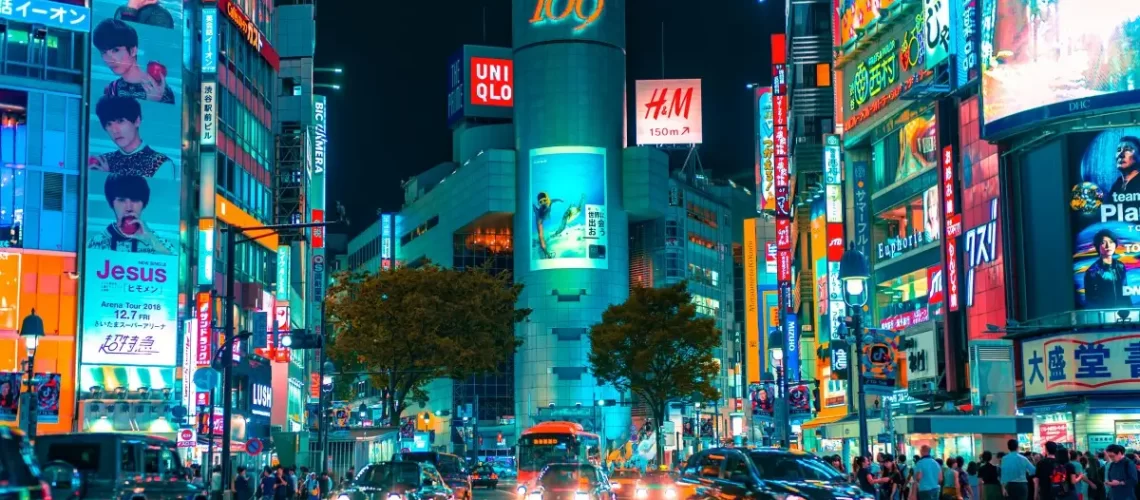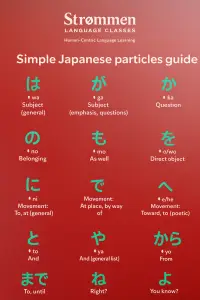Most people assume they’ll get by with English in Japan — but here’s the reality: fewer than 30% of Japanese people speak English at any level. With less than 8% fluent, even simple phrases like thank you or where’s the bathroom? can make or break your trip.
In this guide, you’ll learn over 50 essential Japanese phrases to navigate restaurants, train stations, shops, and hotels while showing genuine respect for Japanese culture. Each table includes the literal translation, helping you understand how Japanese actually works.
✨ Want to build a strong foundation first?
Read our companion guide:
👉 10 Essential Japanese Grammar Rules Every Beginner Should Know (with Literal Translations)
Can You Survive in Japan Without Speaking Japanese?
Technically, yes — but your experience will be limited.
Recent data shows only 15 – 28% of Japanese people speak any conversational English, and less than 2% are fluent. Tokyo ranks highest with an English-proficiency score of 496 / 800 — still considered low proficiency.
What You Can Expect
-
Tourist areas (Tokyo, Kyoto, Osaka) → bilingual signs and some English-speaking staff
-
Hotels and big restaurants → English menus available
-
Train stations in large cities → English displayed next to Japanese
-
Google Translate (camera mode) → excellent for signs/menus
-
Rural towns → almost no English support
-
Emergencies → much easier if you know a few Japanese phrases
So while you can travel without Japanese, knowing a few words will open doors — literally and figuratively. Locals deeply appreciate even simple efforts to speak their language.
🌞 Common Japanese Greetings
| Japanese | Romaji | Literal Breakdown | Meaning |
|---|---|---|---|
| こんにちは | konnichiwa | kon (this) + nichi (day) + wa (as for) | Hello / Good afternoon |
| おはようございます | ohayou gozaimasu | o (honorific) + hayai (early) + gozaimasu (polite be) | Good morning (formal) |
| こんばんは | konbanwa | kon (this) + ban (evening) + wa (as for) | Good evening |
| さようなら | sayounara | sayou (like that) + nara (if it is so) | Goodbye |
| ありがとうございます | arigatou gozaimasu | arigatai (grateful) + gozaimasu (polite be) | Thank you very much |
| すみません | sumimasen | sumi (finish) + masen (neg.) | Excuse me / I’m sorry |
| お願いします | onegaishimasu | negau (to request) + shimasu (do) | Please |
| はい | hai | — | Yes |
| いいえ | iie | i (neg.) + ie (no) | No |
🚻 Basic Survival Phrases
| Japanese | Romaji | Literal Breakdown | Meaning |
|---|---|---|---|
| トイレはどこですか | toire wa doko desu ka | toilet + topic wa + where + is + ? | Where is the bathroom? |
| 〜はどこですか | ~ wa doko desu ka | ~ (topic) + where + is + ? | Where is ~? |
| いくらですか | ikura desu ka | how much + is + ? | How much is it? |
| 英語を話せますか | eigo wo hanasemasu ka | English + object + can speak + ? | Do you speak English? |
| 大丈夫です | daijoubu desu | dai (big) + joubu (strong) + is | It’s okay / I’m fine |
| ごめんなさい | gomen nasai | gomen (apology) + nasai (please do) | I’m sorry |
| 分かりません | wakarimasen | wakaru (understand) + masen (neg.) | I don’t understand |
| 助けてください | tasukete kudasai | tasukeru (help) + kudasai (please) | Please help |
| チェックをお願いします | chekku wo onegaishimasu | check + object + please do | Can I have the check, please? |
| これをください | kore wo kudasai | this + object + please give me | This, please |
🍜 How to Order Food & Drinks
When you enter a Japanese restaurant, the staff greets you with いらっしゃいませ (irasshaimase) — “welcome.”
They’ll ask 何名様ですか (nanmei-sama desu ka) — “how many people?”
| Japanese | Romaji | Literal Breakdown | Meaning |
|---|---|---|---|
| 英語のメニューはありますか | eigo no menyuu wa arimasu ka | English + menu + topic + exist + ? | Do you have an English menu? |
| すみません | sumimasen | see above | Excuse me (to get attention) |
| これをお願いします | kore wo onegaishimasu | this + object + please do | This, please |
| 〜をお願いします | ~ wo onegaishimasu | [item] + object + please do | I’d like [item], please |
| 〜をください | ~ wo kudasai | [item] + object + please give me | Please give me [item] |
| オススメは何ですか | osusume wa nan desu ka | recommendation + topic + what + is + ? | What do you recommend? |
| メニューをお願いします | menyuu wo onegaishimasu | menu + object + please do | Menu, please |
| 二人です | futari desu | two people + is | Two people |
| お冷をお願いします | ohiya wo onegaishimasu | cold water + object + please do | Cold water, please |
| お代わりをお願いします | okawari wo onegaishimasu | refill + object + please do | Refill, please |
| 会計をお願いします | kaikei wo onegaishimasu | bill + object + please do | Check, please |
| もう一つください | mou hitotsu kudasai | more + one thing + please give me | One more, please |
| 少々お待ちください | shoushou omachi kudasai | little + wait + please give | Please wait a moment |
| かんぱい | kanpai | kan (dry) + pai (cup) | Cheers (“empty the cup”) |
| いただきます | itadakimasu | itadaku (receive humbly) + masu (polite ending) | Expression before eating |
🛍 Common Shopping Phrases
| Japanese | Romaji | Literal Breakdown | Meaning |
|---|---|---|---|
| 何かお探しですか | nanika osagashi desu ka | something + search (be) + ? | Are you looking for something? |
| いいえ、見ているだけです | iie, mite iru dake desu | no + seeing + only + is | No, I’m just looking |
| 〜を探しています | ~ wo sagashite imasu | [item] + object + search doing am | I’m looking for [item] |
| これ、いくらですか | kore ikura desu ka | this + how much + is + ? | How much is this? |
| 試着できますか | shichaku dekimasu ka | try-on + can do + ? | Can I try this on? |
| 他の色はありますか | hoka no iro wa arimasu ka | other + color + topic + exist + ? | Do you have another color? |
| もう少し安くなりますか | mou sukoshi yasuku narimasu ka | more + a little + cheap + become + ? | Can you make it cheaper? |
| 袋は要りますか | fukuro wa irimasu ka | bag + topic + need + ? | Do you need a bag? |
| カードで払えますか | kaado de haraemasu ka | card + by + can pay + ? | Can I pay by card? |
| 領収書をください | ryoushuusho wo kudasai | receipt + object + please give me | Please give me a receipt |
🚉 Asking for Directions
| Japanese | Romaji | Literal Breakdown | Meaning |
|---|---|---|---|
| すみません、〜はどこですか | sumimasen, ~ wa doko desu ka | excuse me + topic + where + is + ? | Excuse me, where is ~? |
| ちょっといいですか | chotto ii desu ka | a bit + good + is + ? | May I ask you something? |
| 〜へはどうやって行きますか | ~ e wa dou yatte ikimasu ka | to (destination) + topic + how + go + ? | How do I get to ~? |
| 助けてくれますか | tasukete kuremasu ka | help + give me + ? | Can you help me? |
Directions you’ll hear:
| Japanese | Romaji | Literal Breakdown | Meaning |
|---|---|---|---|
| まっすぐ行ってください | massugu itte kudasai | straight + go + please do | Please go straight |
| 右に曲がってください | migi ni magatte kudasai | right + at + turn + please do | Turn right |
| 左に曲がってください | hidari ni magatte kudasai | left + at + turn + please do | Turn left |
| 交差点で左に曲がってください | kousaten de hidari ni magatte kudasai | intersection + at + left + turn + please | Turn left at the intersection |
| 次の角を右に曲がってください | tsugi no kado wo migi ni magatte kudasai | next + corner + object + right + turn + please | Turn right at the next corner |
| 駅はあそこです | eki wa asoko desu | station + topic + over there + is | The station is over there |
🏨 Hotel Phrases
| Japanese | Romaji | Literal Breakdown | Meaning |
|---|---|---|---|
| 予約をしています | yoyaku wo shite imasu | reservation + object + doing am | I have a reservation |
| チェックインをお願いします | chekku in wo onegaishimasu | check-in + object + please do | Check-in, please |
| 部屋の鍵をください | heya no kagi wo kudasai | room + key + object + please give | Please give me the room key |
| WiFiのパスワードを教えてください | WiFi no pasuwaado wo oshiete kudasai | Wi-Fi + password + object + teach + please | Please tell me the Wi-Fi password |
| 部屋を掃除してください | heya wo souji shite kudasai | room + object + clean do + please | Please clean the room |
| お湯が出ません | oyu ga demasen | hot water + subject + not come out | Hot water isn’t coming out |
| エアコンが動きません | eakon ga ugokimasen | air-con + subject + not move | The AC isn’t working |
| もう一つ枕をください | mou hitotsu makura wo kudasai | one more + pillow + object + please give me | One more pillow, please |
| 荷物を預けられますか | nimotsu wo azukeraremasu ka | luggage + object + leave can + ? | Can I leave my luggage? |
| チェックアウトをお願いします | chekku auto wo onegaishimasu | check-out + object + please do | Check-out, please |
| ありがとうございました | arigatou gozaimashita | arigatai (grateful) + gozaimashita (polite past) | Thank you very much (past tense) |
🕒 Time-Related Phrases
| Japanese | Romaji | Literal Breakdown | Meaning |
|---|---|---|---|
| 今何時ですか | ima nanji desu ka | now + what time + is + ? | What time is it now? |
| 今日 | kyou | this + day | Today |
| 明日 | ashita | tomorrow | Tomorrow |
| 昨日 | kinou | previous + day | Yesterday |
| 何時に? | nanji ni | what time + at | At what time? |
| 午後 | gogo | after + noon | Afternoon |
| 夜 | yoru | night / evening | Night |
| 朝 | asa | morning | Morning |
| いつでも | itsudemo | when + ever | Anytime |
| 時間がありません | jikan ga arimasen | time + subject + not exist | I don’t have time |
🎬 Learn Japanese Naturally
Most learners struggle because they memorize phrases without context. To sound natural, learn through real conversations, films, and shows — that’s how rhythm, tone, and politeness truly make sense.
For grammar structure, review:
👉 10 Essential Japanese Grammar Rules Every Beginner Should Know (with Literal Translations)
Ready to Speak Japanese?
These 50+ phrases will get you through your Japan trip — but imagine understanding what people say back. That’s when your journey shifts from surviving to truly connecting.
Japanese isn’t about memorizing; it’s about rhythm, respect, and curiosity.
Start small, listen closely, and practice with intention — the way language was always meant to be learned.
FAQs
What are some helpful tourist phrases in Japan?
Konnichiwa (こんにちは) – Hello / Good afternoon
Sumimasen (すみません) – Excuse me / Sorry
Arigatou Gozaimasu (ありがとうございます




